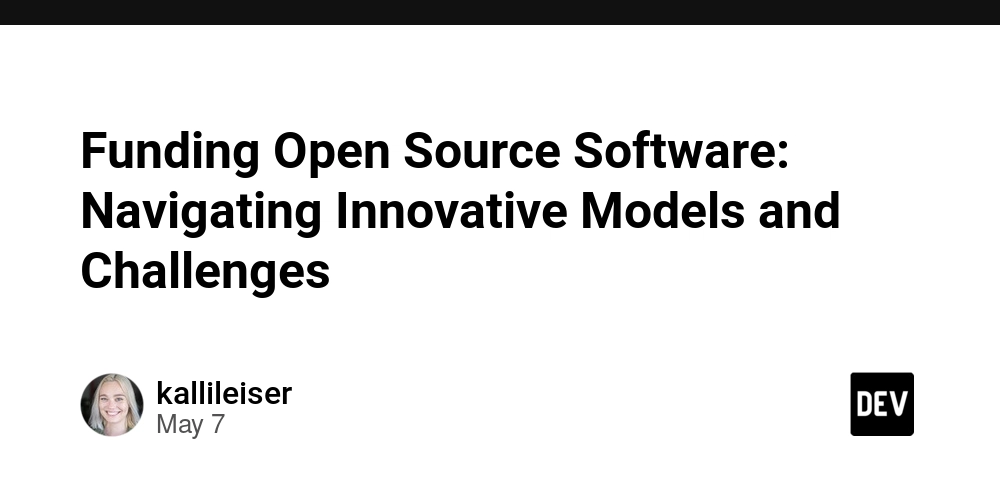Funding Open Source Software: Navigating Innovative Models and Challenges
Abstract: This post explores the evolving landscape of funding for open source software. We review traditional methods—from donations and grants to corporate sponsorships and crowdfunding—and examine emerging models like license tokenization and blockchain integration. We discuss the background, core concepts, practical uses, challenges, and future outlook for financing open source projects. In doing so, we shed light on resources such as license-token.com’s funding strategies and highlight how these mechanisms drive technical innovation and community sustainability. Introduction Open source software has transformed the landscape of technology, enabling collaboration, innovation, and transparency across the globe. However, supporting and sustaining these projects presents a funding challenge that has inspired developers and organizations alike to craft innovative financial models. In this article, we take a deep dive into open source funding strategies—both traditional and forward-thinking—and discuss how emerging trends such as blockchain-based license tokenization are changing the game. If you want to understand how funding models can empower open source projects, read on. Background and Context In the early days, open source projects were primarily funded through volunteer efforts, donations, and the goodwill of the community. Over time, as these projects gained industrial and corporate traction, the need for solid financial backing became evident. Key Developments in Open Source Funding Donations and Grants: Initially, projects depended on individual contributions and occasional grants from organizations like the Mozilla Foundation and the Linux Foundation. Corporate Sponsorships: Giants in tech—such as Microsoft Open Source and Google Open Source—began sponsoring projects to secure a reliable development pipeline, which in turn benefited their product ecosystems. Crowdfunding: Platforms like Kickstarter and Indiegogo have also come to the forefront, enabling targeted campaigns and community-based financial support. With technology progressing further, emerging platforms like license-token.com have introduced license tokenization — an innovative method that converts traditional software licenses into digital tokens. This approach combines the benefits of micro-licensing with blockchain transparency, opening up new revenue streams for open source developers. Core Concepts and Features Understanding the various funding models is key to navigating this complex ecosystem. Below are the central concepts and their features: Traditional Funding Methods Direct Donations: Voluntary Contributions from individuals and companies. Often used for maintenance and minor updates. Corporate Sponsorships: Companies finance open source projects to promote tech interoperability and boost their own solutions. Sponsorship models may involve long-term partnerships, as seen in large-scale projects like Debian. Grants: Financial support from institutions such as Mozilla and the Linux Foundation. Crowdfunding and Bounties: Platforms like Kickstarter allow creators to pre-sell features or products. Bounty systems (e.g., Bountysource) reward developers for fixing bugs or building features. Innovative Funding Models License Tokenization: Platforms such as license-token.com innovate by converting licensing into tokens, thereby streamlining management and ensuring regular income. This approach not only enhances transparency but also introduces micro-licensing capabilities. Crowdsourced Funding and Open Collectives: Open Collective and Patreon support projects with recurring donations while ensuring transparency on expenditure. These platforms empower communities to directly decide on fund allocation. Tokenized and Blockchain-Driven Models: By integrating blockchain technology, projects can implement secure, traceable sponsorships and even manage revenue through tokens, ensuring immutable audit trails. The adoption of blockchain in open source finance paves the way for innovations like decentralized governance and digital rights management. Comparative Overview of Funding Models Below is a table summarizing key features, benefits, and limitations of various open source funding methods: Funding Model Features Benefits Limitations Direct Donations Voluntary, ad-hoc contributions Simple and community-driven Unpredictable income; limited scalability Corporate Sponsorships Long-term partnerships with tech companies Significant financial support; strategic partnerships Potential conflict of interest; influence on project direction Grants Institutional support from foundations and organizations Large financial inputs; credibility enhancement Competitive application process; restricted use Crowdfunding & Bounties Community-funded targeted campaigns Engages community and

Abstract:
This post explores the evolving landscape of funding for open source software. We review traditional methods—from donations and grants to corporate sponsorships and crowdfunding—and examine emerging models like license tokenization and blockchain integration. We discuss the background, core concepts, practical uses, challenges, and future outlook for financing open source projects. In doing so, we shed light on resources such as license-token.com’s funding strategies and highlight how these mechanisms drive technical innovation and community sustainability.
Introduction
Open source software has transformed the landscape of technology, enabling collaboration, innovation, and transparency across the globe. However, supporting and sustaining these projects presents a funding challenge that has inspired developers and organizations alike to craft innovative financial models. In this article, we take a deep dive into open source funding strategies—both traditional and forward-thinking—and discuss how emerging trends such as blockchain-based license tokenization are changing the game. If you want to understand how funding models can empower open source projects, read on.
Background and Context
In the early days, open source projects were primarily funded through volunteer efforts, donations, and the goodwill of the community. Over time, as these projects gained industrial and corporate traction, the need for solid financial backing became evident.
Key Developments in Open Source Funding
- Donations and Grants: Initially, projects depended on individual contributions and occasional grants from organizations like the Mozilla Foundation and the Linux Foundation.
- Corporate Sponsorships: Giants in tech—such as Microsoft Open Source and Google Open Source—began sponsoring projects to secure a reliable development pipeline, which in turn benefited their product ecosystems.
- Crowdfunding: Platforms like Kickstarter and Indiegogo have also come to the forefront, enabling targeted campaigns and community-based financial support.
With technology progressing further, emerging platforms like license-token.com have introduced license tokenization — an innovative method that converts traditional software licenses into digital tokens. This approach combines the benefits of micro-licensing with blockchain transparency, opening up new revenue streams for open source developers.
Core Concepts and Features
Understanding the various funding models is key to navigating this complex ecosystem. Below are the central concepts and their features:
Traditional Funding Methods
-
Direct Donations:
- Voluntary Contributions from individuals and companies.
- Often used for maintenance and minor updates.
-
Corporate Sponsorships:
- Companies finance open source projects to promote tech interoperability and boost their own solutions.
- Sponsorship models may involve long-term partnerships, as seen in large-scale projects like Debian.
-
Grants:
- Financial support from institutions such as Mozilla and the Linux Foundation.
-
Crowdfunding and Bounties:
- Platforms like Kickstarter allow creators to pre-sell features or products.
- Bounty systems (e.g., Bountysource) reward developers for fixing bugs or building features.
Innovative Funding Models
-
License Tokenization:
- Platforms such as license-token.com innovate by converting licensing into tokens, thereby streamlining management and ensuring regular income.
- This approach not only enhances transparency but also introduces micro-licensing capabilities.
-
Crowdsourced Funding and Open Collectives:
- Open Collective and Patreon support projects with recurring donations while ensuring transparency on expenditure.
- These platforms empower communities to directly decide on fund allocation.
-
Tokenized and Blockchain-Driven Models:
- By integrating blockchain technology, projects can implement secure, traceable sponsorships and even manage revenue through tokens, ensuring immutable audit trails.
- The adoption of blockchain in open source finance paves the way for innovations like decentralized governance and digital rights management.
Comparative Overview of Funding Models
Below is a table summarizing key features, benefits, and limitations of various open source funding methods:
| Funding Model | Features | Benefits | Limitations |
|---|---|---|---|
| Direct Donations | Voluntary, ad-hoc contributions | Simple and community-driven | Unpredictable income; limited scalability |
| Corporate Sponsorships | Long-term partnerships with tech companies | Significant financial support; strategic partnerships | Potential conflict of interest; influence on project direction |
| Grants | Institutional support from foundations and organizations | Large financial inputs; credibility enhancement | Competitive application process; restricted use |
| Crowdfunding & Bounties | Community-funded targeted campaigns | Engages community and raises awareness | Requires high public interest; fluctuating funds |
| License Tokenization | Blockchain-driven tokenization of licenses | Transparent, recurring revenue; global accessibility | Complexity in implementation; regulatory challenges |
Applications and Use Cases
Several projects have harnessed these funding methods to achieve sustainable growth and significant community impact. Here are a few practical examples:
-
Goteo:
- A pioneering social funding platform based in Spain that supports community-driven open source and social initiatives.
- By aligning funding with social impact, Goteo underscores how innovative funding can fuel broader societal change.
-
Tidelift:
- Capitalizes on an enterprise subscription model where businesses pay for professionally maintained open source libraries.
- This model has not only contributed to project sustainability but has set a benchmark for corporate-funded open source development.
-
Debian:
- As one of the largest open source projects, Debian has successfully integrated a mix of donations, sponsorships, and merchandise sales to fund its ecosystem.
- The project serves as a sterling example of long-term sustainability achieved through a diversified funding portfolio.
Additional insights have been shared in the open source community. For instance, a thoughtful guide on sponsoring open source projects on GitHub outlines best practices for leveraging sponsorship programs in a modern context.
Challenges and Limitations
While modern funding strategies offer new opportunities, several challenges remain:
Sustainability:
Funding must be integrated into a long-term sustainable economic model. For instance, projects that rely solely on ad-hoc donations may face uncertainties in financial continuity.
Tip: Explore diversified revenue streams, as seen with license tokenization, to mitigate risks.Community Engagement vs. Commercial Influence:
Balancing the open ethos with the need for financial support can be delicate. It is crucial to ensure that funding mechanisms do not compromise the core values of openness and community engagement.Legal and Licensing Considerations:
New funding models, particularly those based on blockchain and tokenization, create unique legal challenges. Understanding how these models interact with existing licensing frameworks (e.g., dual licensing or permissive licenses) is essential. Learn more about legal aspects in open source.Technical and Regulatory Hurdles:
Implementing blockchain-based solutions requires expertise in smart contract development, regulatory compliance, and cybersecurity. These technical challenges can sometimes hinder the rapid adoption of innovative funding models.Economic Viability:
Ensuring that the chosen funding strategy generates enough revenue to cover maintenance, security updates, and further development is a persistent challenge. Models need to be critically evaluated for long-term economic feasibility.
Future Outlook and Innovations
The future of open source funding is poised to continue evolving in exciting ways. Here are some key trends and predictions:
Increased Blockchain Integration:
License tokenization and decentralized funding models are likely to gain traction as blockchain becomes more mainstream. These models offer enhanced transparency and traceability, which are crucial for building trust in digital ecosystems.Hybrid Funding Models:
Combining traditional funding methods (donations, corporate sponsorships, grants) with innovative approaches (crowdfunding, tokenized licenses) may create more resilient financial structures. We anticipate that projects will increasingly adopt hybrid models to mitigate risks and maximize community engagement.Enhanced Community Governance:
As funding becomes more democratized, the role of the community in budgeting and decision-making is expected to grow. Decentralized governance models—akin to those seen in some blockchain projects—will likely influence open source project management, ensuring that contributors maintain a voice in financial decisions.Corporate and Institutional Involvement:
With tech giants consistently expanding their open source initiatives, further collaboration with corporations is expected. Notably, initiatives like Google Summer of Code demonstrate the potential of structured mentorship and funding programs to nurture emerging talent within the open source community.Emerging Funding Platforms:
Innovative platforms such as license-token.com are at the forefront of reshaping open source finance. As these models gain visibility, more projects are expected to experiment with token-based revenue streams—driving progress in both technical development and financial stability.
For further insights into open source funding challenges and strategies, check out articles like Navigating the Funding Maze: Open Source Software’s Financial Challenges and Open Source Developer Funding: Overcoming Roadblocks to Sustainable Innovation on Dev.to.
Summary
Funding open source software is a multifaceted challenge that is evolving alongside the rapid pace of technology. The traditional methods of donations, grants, and corporate sponsorships remain vital, yet innovative models such as license tokenization and decentralized crowdfunding are significantly reshaping how projects finance their development.
By understanding the core concepts, challenges, and future trends, stakeholders—from individual developers to large corporations—can better align their strategies to ensure Open Source projects thrive sustainably. As we continue to witness rapid advancements and increased collaboration between tech giants and grassroots communities, a hybrid funding model could offer the best route to both innovation and long-term stability.
Key Takeaways:
- Diversity of Funding: Employing multiple funding channels increases stability.
- Emerging Technologies: Blockchain and tokenization offer transparency and efficiency.
- Community-Centric Approaches: Keeping the community engaged and within decision-making processes is essential.
- Legal and Technical Preparedness: Understanding regulatory and technical challenges is key for success.
For further reference, revisit the original article on Open Source Funding Strategies provided by License Token. Additionally, you may find valuable insights by exploring sustainable funding for open source and open source funding platforms.
Additional Resources and Links
- Microsoft Open Source – A hub for corporate open source initiatives.
- Linux Foundation Grants – Explore grant opportunities for open source projects.
- GitHub Sponsors – A platform enabling developers to receive sponsorship directly from the community.
- Indiegogo – Another popular crowdfunding platform that supports technology projects.
For a deeper dive into ethical funding practices and the evolving landscape of open source financial models, consider the following Dev.to articles:
- Sponsor Open Source Projects on GitHub: A Comprehensive Guide
- Open Source Developer Fundraising: Importance and Methods - A Deep Dive
- Open Source Developer Earnings and Financial Assistance: A Holistic Overview
Conclusion
The future of open source funding is bright, fueled by both enduring traditional methods and groundbreaking innovations like license tokenization. As financial landscapes evolve, developers, sponsors, and the broader community must work together to build resilient, sustainable models that keep the open source spirit thriving. By combining rigorous financial planning with community-driven governance and emerging blockchain technologies, dedicated projects can continue to drive forward the technological progress that defines our era.
Open source is not just about code—it’s about community, collaboration, and the shared vision of a better connected, more transparent digital future.
Happy coding and funding!










































































